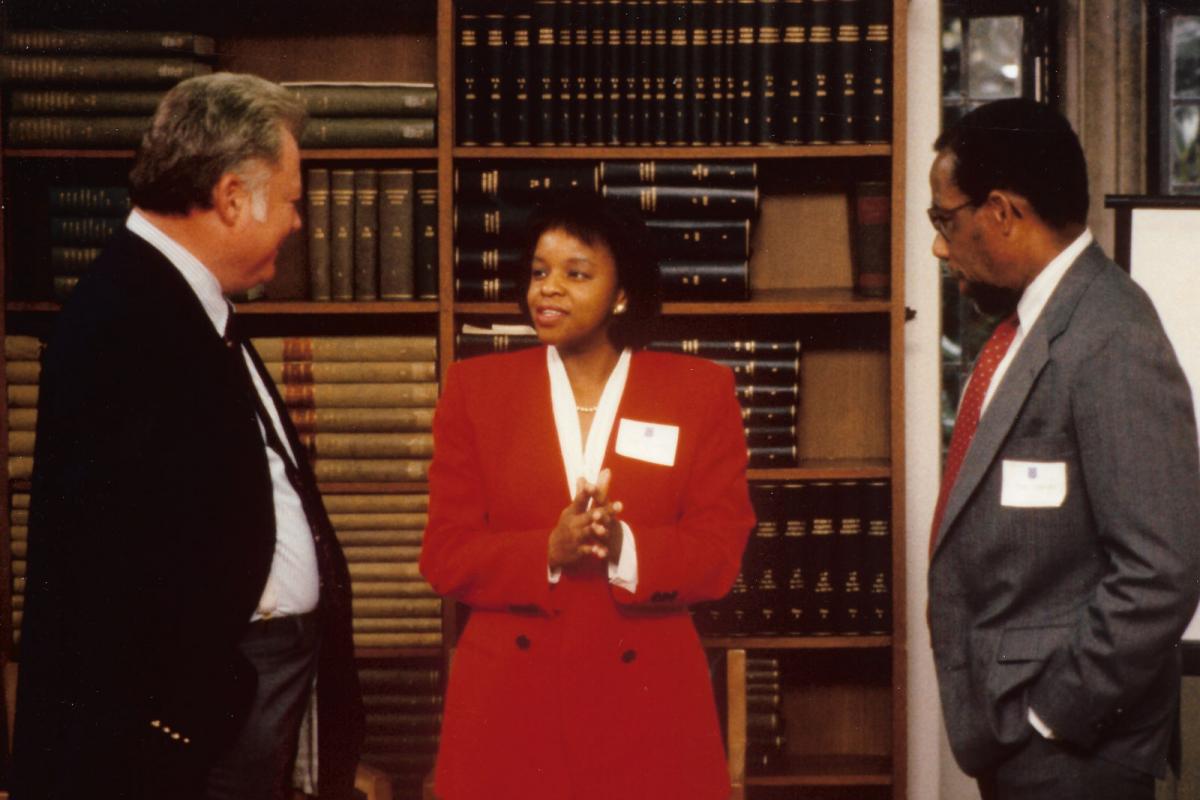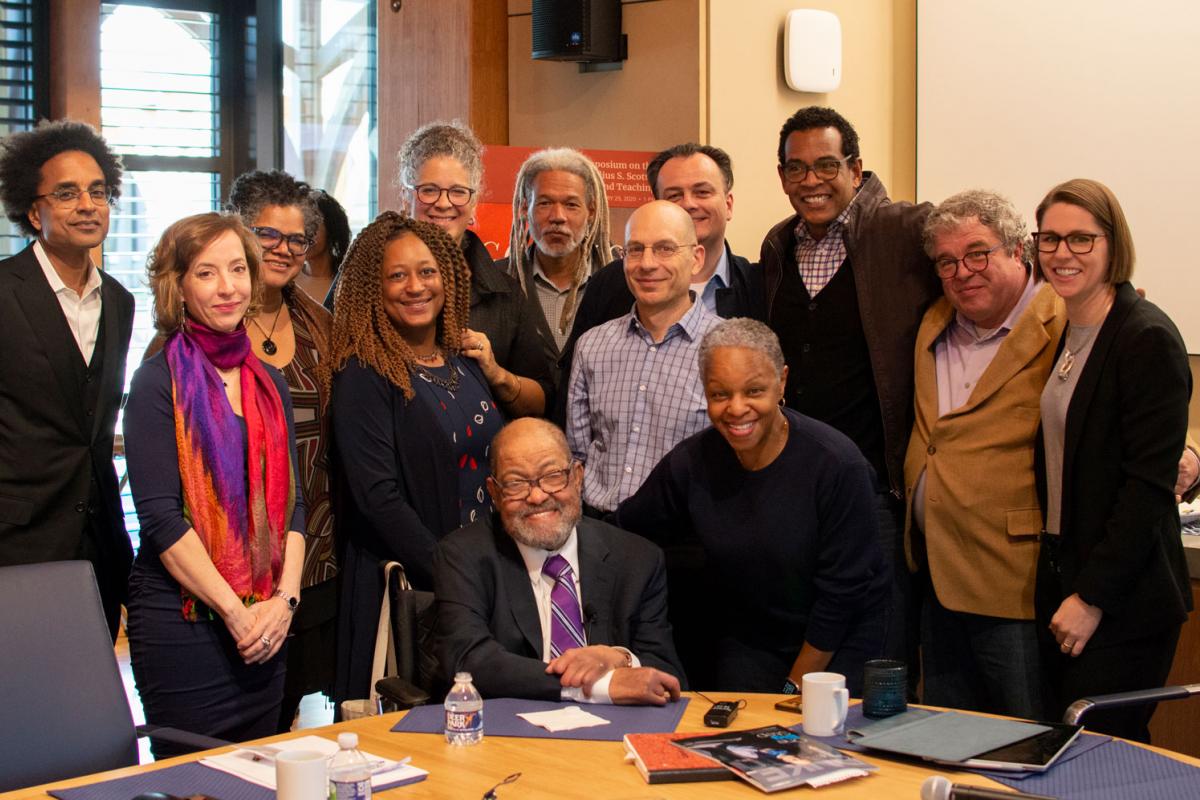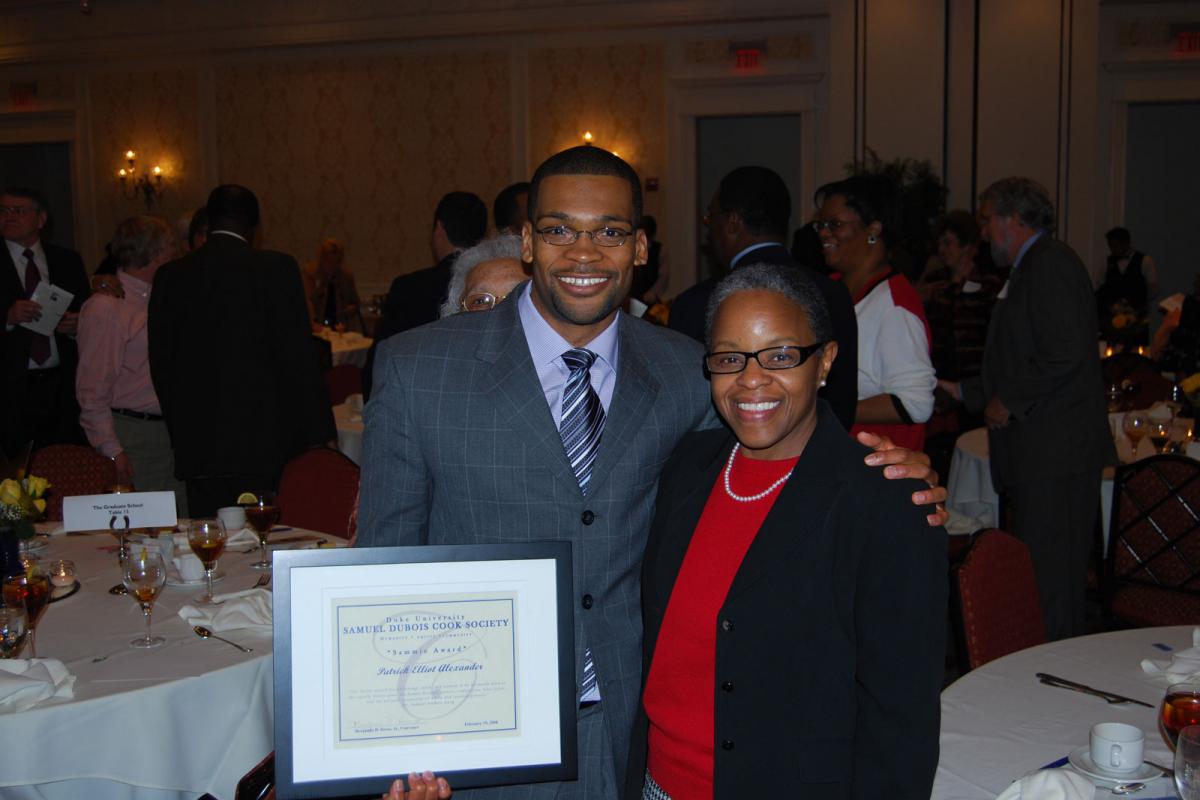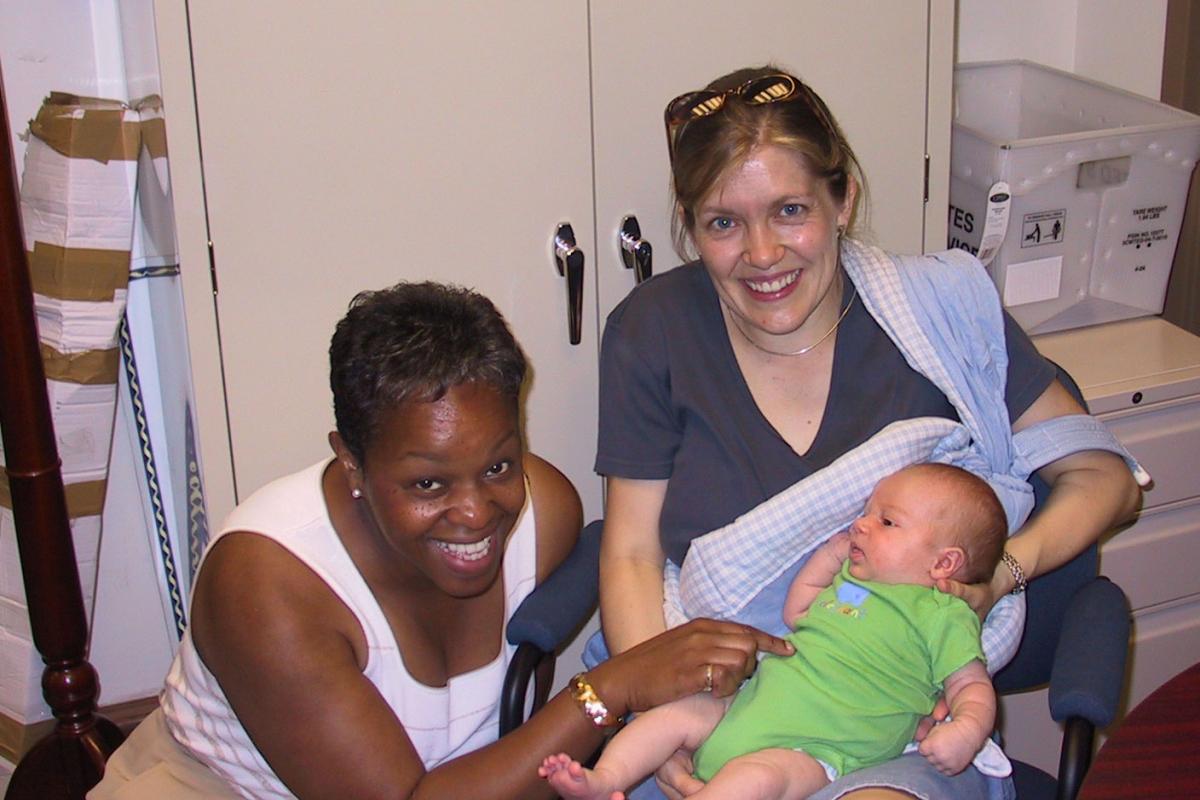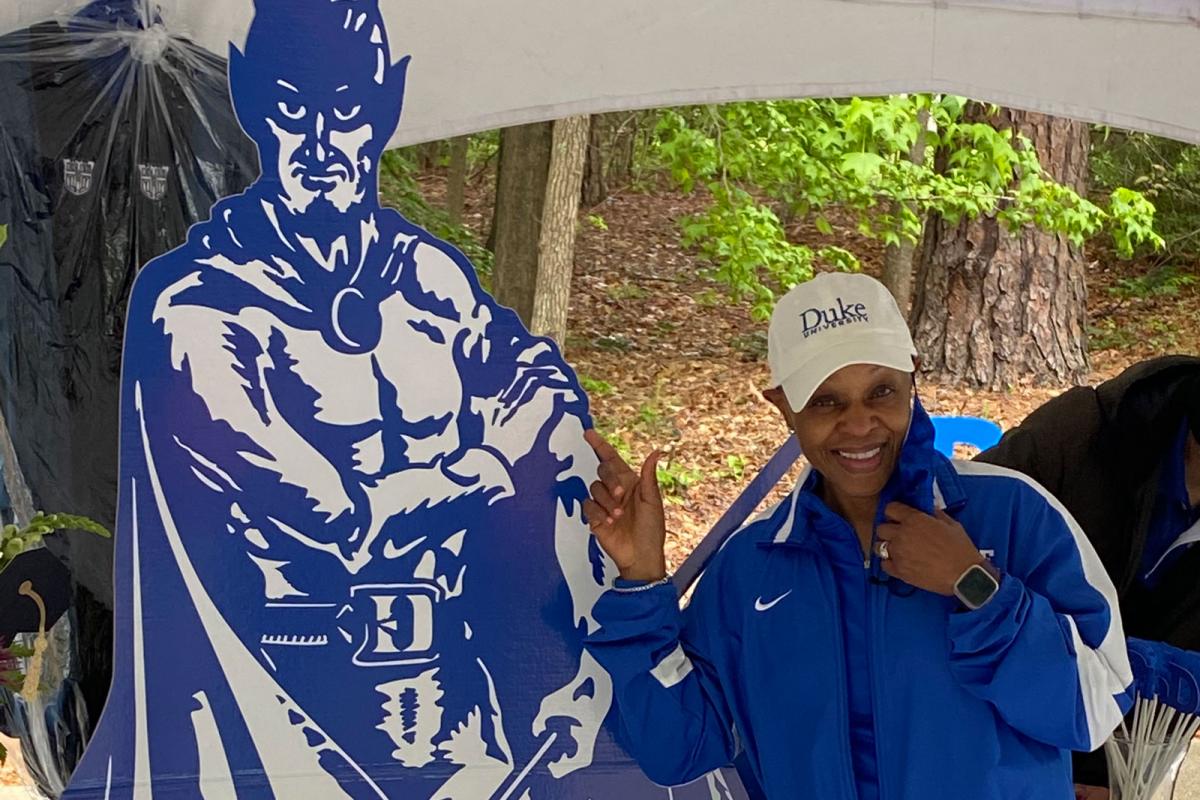
It’s 5 a.m., and Jacqueline Looney is already up. While a devotional plays on an app, she skims the news—first the New York Times in print for the top stories of the day, and then the local headlines on her phone for names she might recognize.
Satisfied that none of her students are in the news for the wrong reasons that day, she kicks her routine into the next gear: A cup of lemon water—hot. A bike ride on the American Tobacco Trail. Shower. Coffee—black.
By the time she walks into the Office of Graduate Student Affairs at the start of the workday, Looney is ready to go, with a plan in mind and eager to meet the day head on.
Often though, the day meets her head on—a call from a concerned faculty member, a name in a campus police report, a drop-in from a distressed student. On those days, the plan is shelved, calendars are cleared, and her attention is redirected squarely to the issue at hand.
“I never walk into my office without a plan,” Looney said. “That doesn’t mean I’m going to execute that plan, because something else can throw it off. I always have specific things I’m working on, but one serious student case happens, and you have to literally push all the stuff aside on your desk and deal with this one thing. What you thought was a priority when you entered the office is no longer a priority. The student is always the priority.”
This has been her routine for years. Decades. Pretty soon, though, she will need a new routine and a new plan. After 30 years at Duke and The Graduate School, Looney will retire from her role as senior associate dean and associate vice provost at the end of June, concluding a career in which she left her mark on many aspects of the graduate student experience.
“I’m very curious how it feels to get up and go, ‘Ok, what do I do with this day?’ ” she said. “I wake up at 5 o’clock because I’m so eager to meet the day. I’ve always been like that. Sometimes as a child, I would just lay there and say, ‘I want to get up; I want to get up; I want to get up. C’mon morning, come!’ I’m still that way today.”

“What Is Duke?”
In 1987, Looney was a young assistant professor of psychology at a small state school in Tennessee, and she was miserable. She was one of only two Black faculty members in a big department, and the only Black woman. She had a heavy teaching load, little support for junior faculty, and few peers she could relate to. It was nothing like her experience as a graduate student at Vanderbilt.
“I would go to my office at the end of my classes and I would literally cry,” she said. “This was not how I envisioned being a faculty member.”
So she started looking at other jobs in teaching or administration. One of those was a position at Duke as assistant dean for graduate recruitment, with a focus on recruiting and retaining minority students.
“I was like, ‘What is Duke?’ ” Looney said. “I was not familiar with Duke. In fact, at that time Duke was still pretty much coming into its own and it was very regional. I applied and forgot about it—I applied to a lot of places.”
Duke called months later, and once she jogged her memory, Looney came to Durham for an interview. At the end of the visit, Malcolm Gillis, the dean of The Graduate School at the time, offered her the job. She told him she had no experience recruiting students. He didn’t care; she was his choice.
“Malcolm said, ‘I see something, and I want to be a part of it. I think you’re going to be great,’ ” Looney said.
She took the job and set about learning how to recruit. She researched what other schools did and cold-called counterparts at other institutions to ask questions. Before long, she was representing Duke at events and in organizations where the university had no presence before, working to dispel stereotypes about the South and assuage the concerns of prospective students, many of whom asked the same question she once did: What is Duke?
“Duke was very difficult to recruit for in the early days because folks had never heard of Duke, and Duke was in the South,” Looney said. “It was a hard sell.”
Malcolm said, “I see something, and I want to be a part of it. I think you’re going to be great.”
Despite the challenges, she started producing results. During her seven years in the role, the number of African American Ph.D. students at Duke more than doubled, and the number of Hispanic Ph.D. students also grew. She recruited a string of outstanding students of color for the history Ph.D. program (for which she was later honored by the American Historical Society), as well as cohorts of minority students in STEM. She built partnerships with departments and faculty. She also enlisted the students she had recruited, who squeezed into her brown Buick Regal and rode with her to recruitment events all over the region.
“She came with a perspective that I could appreciate,” said physics professor Calvin Howell, who was on the hiring committee that interviewed Looney and has collaborated with her on multiple initiatives since. “Over the years I’ve seen that develop into almost a mission to find ways to look at America for different types of talent that would be applicable to the academic environment.”

One of the students in those early cohorts was Carmichael Roberts (B.S.’90, Ph.D.’95 Organic Chemistry), now a member of Duke’s Board of Trustees. He first met Looney in the late 80s, when he was a Duke undergraduate and feeling a bit lost as he considered graduate school.
“There aren’t that many people in my family that had gone to college, let alone graduate school, so I was in uncharted territory,” Roberts said. “She got wind of this, because one of the great things about Jackie is that she made it a point to find young people who were thinking about grad school, who probably needed advice and would never find her, and she was always excellent at trying to find them.
“Jackie was one of five people who were instrumental in me going to grad school, period. And she was one of the top two people who were the reason I went to Duke.”
Although Looney was recruiting for Duke, when Roberts narrowed his choice to between Duke and Yale, she did not hesitate to call her Yale counterpart to lobby for a better financial package on his behalf.
“What she wants, more than anything, is to make a difference in a person’s life,” Roberts said. “You can feel that with Jackie. In the very first meeting, you can tell that this is a person whom you can trust, who has your best interest at heart, without any interest in it for herself.”
“Sister Bear”
A year after she arrived at Duke, Looney crossed paths with Danielle Ramdath (Danielle Carr at the time) in the Allen Building. Ramdath had just finished a challenging first year in the mathematics Ph.D. program and was feeling worn down.
“She pulled me into her office and she just talked to me as if I were a human being,” Ramdath said. “She reminded me that I was human, and that was the first time I met her. She took note of me and kept following up with me. That was huge.
“The nature of research is for you to dig, dig, dig, and you have a relationship with your advisor and your thesis committee, but you’re also in danger of really isolating yourself. Jackie made sure I stayed connected with other folks. She made sure I had connections outside the math department.”

Among Ramdath’s most important connections was Looney herself, whom Ramdath described as a mentor, friend, and—on at least one occasion—caretaker. One year while in graduate school, Ramdath was “sick as a dog” during a snowstorm. When Looney found out, she invited Ramdath to her house and took care of her while she recovered.
“So she was Mama Bear, or Sister Bear,” said Ramdath, who has remained in close contact with Looney over the years and is now senior associate dean of academic engagement at Williams College. “She and I can talk more sisterly than I would with a mother, so she was Sister Bear for me. She was fun, too—good music, good food. When I think of a Mama Bear, I don’t think of fun, but Jackie is fun.”
Ramdath was far from unique in the support she received from Looney. During those early years, Looney often had students over for meals and informal conversations.
“I was operating not so much on know-how, but more on instinct,” Looney said. “If you are having a hard time, my mother would say, ‘Ok, you need a good hot meal,’ or ‘You need to take yourself out of the situation; come sit on my back porch with me.’ So that’s what I was literally doing. It was still very professional, but I was responding instinctively to students in need, and then you learn about their lives.
“In those early days, it was really the students—and not just the students of color�—who taught me how to be a dean. They taught me how to be a dean whose sole responsibility is to provide support and resources for students.”
In 1994, Looney left Duke to be a program officer at The Andrew W. Mellon Foundation. On her way out, she wrote a memo to then-Graduate School Dean Lewis M. Siegel. The memo noted the success of the minority students who had been recruited as Duke Endowment Fellows (now the Dean’s Graduate Fellows), thanks in part to the extra attention and support they received.
“I said, ‘Every graduate student who comes to Duke should get the same kind of care [as the Duke Endowment Fellows] so they can be successful,’ ” Looney recalled.
“And then I said bye.”
“In those early days, it was really the students—and not just the students of color—who taught me how to be a dean.”
Five years later, Siegel flew to New York, took Looney to one of her favorite restaurants, and asked her to come back to The Graduate School to turn her memo into demo. Looney was also looking to leave New York at the time, so she agreed.
In her new role, Looney created the Office of Graduate Student Affairs, which she has overseen since 1999. The office collaborates with campus services to help graduate students get the support they need. It has also worked with students, faculty, staff, and administrators to develop resources and programs to enhance the graduate student experience, such as childcare subsidies and parental accommodations for students with children, medical expense and hardship assistance grants, numerous professional development offerings, expanded orientation activities, the Ph.D. Hooding Ceremony, Graduate Student Appreciation Week, the Milestone Celebration, the Dean’s Award for Excellence in Mentoring, and mentoring workshops for students and faculty.
Looney has also continued to recruit and support underrepresented students. Graduate Student Affairs collaborates with departments on recruitment and oversees the Duke Summer Research Opportunity Program for undergraduates. In 2017, The Graduate School worked with nine Ph.D. programs in the physical sciences and engineering to launch the Duke University Center of Exemplary Mentoring, an effort funded by the Alfred P. Sloan Foundation to recruit and support students from underrepresented minorities. Looney led that effort and serves as the center’s director.
While her scope of responsibility has ballooned to thousands of students, Looney still provides personal mentorship and support to smaller, targeted groups, such as informal monthly conversations with Black women graduate students. She also still makes time for individual students who seek her out or come to her attention.
For instance, when Kelly Tang (Ph.D.’22 Art, Art History and Visual Studies), who interned in Graduate Student Affairs, was applying to be a Young Trustee, Looney took time to coach her on her application.
“Having her as one of my mentors throughout the application process was extremely valuable,” said Tang, who was selected as a Young Trustee in 2020. “The most valuable piece of advice that she gave me that ultimately made me stand out as a nominee was that she encouraged me to go and speak to 10-15 different graduate students and ask them about what the big issues were, and to use that to sharpen my understanding about how I would want to speak the truth about what graduate students were going through if I were to become Young Trustee.”
Looney’s counsel, Tang said, also helped her work through her self-doubt about applying.
“I wasn’t sure that I would be a strong candidate for it,” Tang said. “One of the reasons that it’s so important to have mentors like Dean Looney is because, in a lot of these self-selected university positions, it’s really easy to discount yourself even before you try for it, especially if you come from a minoritized background. But when I told her I was interested, she very quickly pivoted that interest into small steps I could do.”
A Citizen of Duke
Looney’s job focuses on graduate students, but her mentorship and support extend to other members of the Duke community.
Gary Bennett has experienced that first-hand as a Duke Ph.D. student, faculty member, and administrator. Looney helped recruit him to Duke for graduate school in the late 1990s and was a constant presence he could turn to for questions or challenges during his Ph.D. program. He also benefitted from her extensive rolodex of contacts.
“She introduced me to people who were not in my department, but with whom she knew I should have a connection, and they became very important connections to me,” said Bennett, now Duke’s vice provost for undergraduate education and professor of psychology and neuroscience.

“She had a sense of what I needed and looked out for me in that way, and frankly, she never stopped that. When I came back as a faculty member, she was exactly the same person she had been then, and continued to play that role for me. Even as I became an administrator, she would always check in and make sure things are going ok. She’s just a wonderful person who has grown with me over the years.”
Sometimes, Looney’s efforts extend to those who are not even at Duke, yet. In 2015, Looney and her college-bound daughter were attending a workshop for prospective students at the University of North Carolina at Chapel Hill, and a UNC faculty member spoke to the students. Impressed by her knowledge and energy, Looney chased her down in the hallway afterward.
“I said, ‘Listen, I don’t know what the rest of your professional life is going to be like, but I think that you would be great at Duke,’ ” Looney said. “I don’t know if you know that the dean of the College of Arts and Sciences position is open. I think you should look at it. You would be amazing.”
That planted the seed. Months later, that faculty member—Valerie Ashby—traded one shade of blue for another and became the dean of Trinity College.
“She was the first to suggest that,” Ashby said. “That’s what she does. She is always looking for opportunities and fit for other people. And she is brilliant at that.
“Every time I see Jackie, I tell her, ‘You know that I am here because of you.’ She put that into my head.”
Ashby, who will depart Duke this summer to be president of the University of Maryland, Baltimore County, said Looney has helped countless faculty, staff, students, and university leaders navigate Duke in calm times and crises.
“She is brilliant at understanding context, at reading people,” Ashby said. “For our DGSs [directors of graduate studies], their go-to person on the most challenging issues is Jackie Looney. She has people’s trust and no one doubts that she cares about our graduate students. Ever.”
Looney said the time and energy she devotes to supporting people at Duke—not only graduate students, but also others in the community—is just part of being “a citizen of this university.”
“My attitude as I walk across campus is that this is my university. This is my Duke,” she said. “As a citizen, whether it’s in your job description or not, I think you should be about creating the community you want to see.”
And for 30 years, she made it seem routine.
